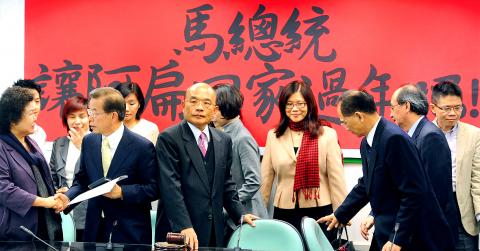The Democratic Progressive Party (DPP) yesterday called on President Ma Ying-jeou (馬英九) to grant former president Chen Shui-bian (陳水扁) medical parole after a magazine reported on the deterioration of Chen’s health.
The DPP Central Standing Committee yesterday reached a resolution to demand that Ma grant medical parole for Chen, who is serving an 18-and-a-half-year sentence for corruption, but has been hospitalized for treatment of various complications.
“We urge President Ma to let former president Chen go home for the Lunar New Year holidays. It’s best for him to be at home with his family during the New Year holidays,” DPP Chairman Su Tseng-chang (蘇貞昌) told a press conference.

Photo: Chu Pei-hsiung, Taipei Times
Support for granting medical parole has become stronger after 17 city and county councils passed resolutions in support of the move, Su said.
The Chinese-language Next Magazine yesterday published an article that cited a 28-second video clip recorded during a visit to see Chen at Taipei Veterans General Hospital, where the former president is undergoing treatment. The report said Chen is suffering deteriorating Parkinson’s disease.
Former DPP lawmaker Twu Shiing-jer (涂醒哲) admitted on a TV political talk show yesterday afternoon that he recorded the video when he visited Chen, but said that he neither distributed the video clip nor posted it on the Internet.
Led by DPP Legislator Mark Chen (陳唐山), eight DPP and Taiwan Solidarity Union (TSU) legislators called a joint press conference yesterday afternoon at the legislature in Taipei, urging the Ministry of Justice to reconsider Chen’s application for medical parole.
If former Executive Yuan secretary-general Lin Yi-shih (林益世), who has been bailed after being indicted on corruption charges, has been able to return to his Kaohsiung home for the Lunar New Year, the former president should receive the same treatment, Mark Chen said.
In Kaohsiung, Chen Chih-chung (陳致中), the former president’s son, said he did not mind Twu recording his father without prior consultation with the family. He said he hoped that medical parole could be granted to his father, who is battling mental illness.

Right-wing political scientist Laura Fernandez on Sunday won Costa Rica’s presidential election by a landslide, after promising to crack down on rising violence linked to the cocaine trade. Fernandez’s nearest rival, economist Alvaro Ramos, conceded defeat as results showed the ruling party far exceeding the threshold of 40 percent needed to avoid a runoff. With 94 percent of polling stations counted, the political heir of outgoing Costa Rican President Rodrigo Chaves had captured 48.3 percent of the vote compared with Ramos’ 33.4 percent, the Supreme Electoral Tribunal said. As soon as the first results were announced, members of Fernandez’s Sovereign People’s Party

MORE RESPONSIBILITY: Draftees would be expected to fight alongside professional soldiers, likely requiring the transformation of some training brigades into combat units The armed forces are to start incorporating new conscripts into combined arms brigades this year to enhance combat readiness, the Executive Yuan’s latest policy report said. The new policy would affect Taiwanese men entering the military for their compulsory service, which was extended to one year under reforms by then-president Tsai Ing-wen (蔡英文) in 2022. The conscripts would be trained to operate machine guns, uncrewed aerial vehicles, anti-tank guided missile launchers and Stinger air defense systems, the report said, adding that the basic training would be lengthened to eight weeks. After basic training, conscripts would be sorted into infantry battalions that would take

GROWING AMBITIONS: The scale and tempo of the operations show that the Strait has become the core theater for China to expand its security interests, the report said Chinese military aircraft incursions around Taiwan have surged nearly 15-fold over the past five years, according to a report released yesterday by the Democratic Progressive Party’s (DPP) Department of China Affairs. Sorties in the Taiwan Strait were previously irregular, totaling 380 in 2020, but have since evolved into routine operations, the report showed. “This demonstrates that the Taiwan Strait has become both the starting point and testing ground for Beijing’s expansionist ambitions,” it said. Driven by military expansionism, China is systematically pursuing actions aimed at altering the regional “status quo,” the department said, adding that Taiwan represents the most critical link in China’s

EMERGING FIELDS: The Chinese president said that the two countries would explore cooperation in green technology, the digital economy and artificial intelligence Chinese President Xi Jinping (習近平) yesterday called for an “equal and orderly multipolar world” in the face of “unilateral bullying,” in an apparent jab at the US. Xi was speaking during talks in Beijing with Uruguayan President Yamandu Orsi, the first South American leader to visit China since US special forces captured then-Venezuelan president Nicolas Maduro last month — an operation that Beijing condemned as a violation of sovereignty. Orsi follows a slew of leaders to have visited China seeking to boost ties with the world’s second-largest economy to hedge against US President Donald Trump’s increasingly unpredictable administration. “The international situation is fraught